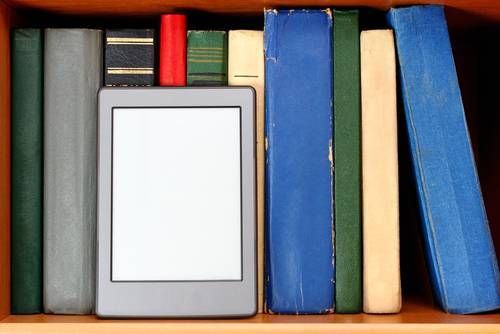
Does E-Reading Change the Way You Read?
Over at the Huffington Post, writer Mark Rubinstein lays out a case for why some people are still resistant to ereading. He doesn’t demonize these folks, but instead offers a reasonable explanation for why they’ve stuck to paper. Paper reading reminds people of childhood, when their love of reading first emerged, he says.
I’ll buy that — makes sense to me. But I have a different (or, at least, supplemental) explanation: People are resistant to ereading because they fear that ereading will change the very specific ways they’re used to reading books. As Rubinstein points out, people resistant to e-reading aren’t necessarily resistant to technology specifically, or change in general. So, to me, it’s just that they fear this one particular aspect of change.
And they’re right. E-reading will fundamentally change the way you read. It has for me. But that’s not a bad thing.
I’m only 18 months into my ereading career, and ereading HAS changed a lot of my reading habits in significant ways. (And by “significant,” I mean much more impactful than finding myself wondering how much battery my hardcover book has left, as I literally did for a brief instant last week.)
Most importantly, I read a lot more now. Not an exclusive ereader, I usually have an ebook and a paper read going at the same time. And so this has led to more finished books. And that’s a great thing! The numbers don’t lie — I read nearly 20 percent more books last year (my first full year with an e-reader) than my best reading year since college (thank you, Goodreads stats). And I’m on pace this year to shatter last year’s record.
Part of this is due to the fact that books come from a much wider variety of sources. I derive an inordinate amount of pleasure for downloading books from the library and Edelwiess or Netgalley. It’s just fun. I was someone who used to operate under the assumption that my book collection was sacred, and that I couldn’t read a book I didn’t own (crazy, right?). This was a significant mental hurdle to get over — a fundamental change to how I read, and why I can empathize with others who are worried ereading will change their reading habits as well. (Side note: My girlfriend actually bought me the ereader for Christmas because she was worried we were running out of space in our apartment for all my books.)
But it’s not just more, it’s also different. The availability of library ebooks has opened up a pathway to books I’d never have read otherwise — another huge benefit of ereading. From Erin Duffy’s Bond Girl to Maggie Shipstead’s Seating Arrangements, I’ve read and really enjoyed novels I would’ve probably missed without the library.
And it’s not just novels: I’ve read more short story collections in the last year-and-a-half than I did in my entire previous reading “career” combined. How could I have considered myself a reader without ever diving into a George Saunders collection?! The NY Times, earlier this year, attributed the “new” popularity of short story collections to ereading. I’m Exhibit A for that theory.
Please know, that if you’re resistant to ereading, none of this intended to demean your choice in any way. Keep doing what you do if it’s what is comfortable. I just wanted to relay the story of how one dyed-in-the-wool paper reader overcame his hesitancies. Remember, ereading vs. paper reading is not an either/or proposition. Ease your way into ereading. Or don’t. Just read however you want, ’cause reading is pretty awesome.
















